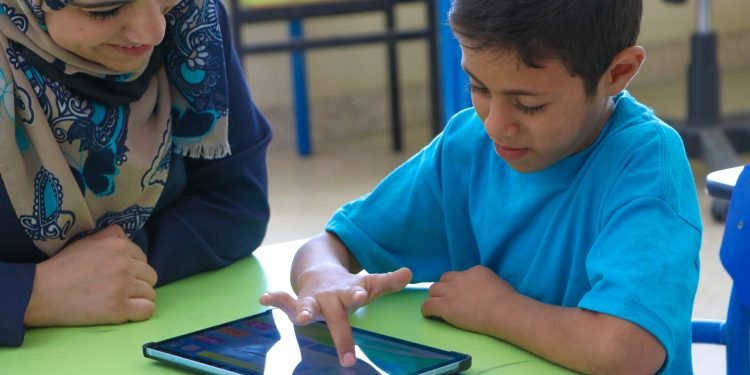Brussels (Brussels Morning) Everyone has the right to education, including Palestine refugees. Access to education is a window of hope and opportunity for over half a million girls and boys attending UNRWA schools. Yousef, a 4th-grade pupil at UNRWA Marka Co-educational School in Amman, has learning difficulties. The EU has equipped him along with some of the most vulnerable UNRWA students in Jordan with digital learning tablets to facilitate and enable their access to the benefits of digital learning.
This ongoing EU-UNRWA initiative across all five fields of UNRWA operations supports children’s access to quality, inclusive and modernised education. Thanks to the tablet, Yousef now has access to a new learning method. The learning apps help him memorise more easily, keep him interested in learning, and support his educational development.
The procurement of tablets is part of the EU-UNRWA “Education for Life” campaign. This initiative speaks to the agency’s commitment to provide quality, inclusive and equitable education through this programme, which is made viable thanks to its partnership with the EU. The tablets allow students to access the newly launched innovative iLearn UNRWA digital platform, and support their access to UNRWA Self-Learning Materials to study from home.
The digital learning tablets provide stability for students during these pandemic times as well as through the challenges Palestine refugee children face in their daily lives. This is especially relevant today, since, for the first time in decades, four out of the five areas where UNRWA operates are simultaneously in crisis: Gaza, the West Bank, including East Jerusalem, Lebanon and Syria.
Teaching human rights, tolerance, and gender equality
We are proud of our education system. UNRWA operates more than 700 elementary and preparatory schools in its five fields of operation, providing free basic education for more than 540,000 students to ensure that Palestine refugee children are not left behind.
Students in UNRWA schools follow the host countries’ national curriculum and textbooks to ensure they can integrate into host secondary and tertiary educational systems. As a UN Agency providing humanitarian and development assistance, UNRWA has no mandate to alter any host government curriculum or textbooks which are a matter of national sovereignty.
UNRWA regularly reviews all newly issued textbooks by the host countries since it is committed to ensuring that what is taught in UNRWA schools adheres to UN values and principles. Moreover, the agency enriches host countries’ curricula to encourage the development of critical thinking skills, by teaching human rights, conflict resolution, tolerance, and gender equality.
Despite UNRWA’s continued efforts, acting as an antidote to intolerance in one of the most challenging environments in the world, the agency has been confronted by an increase in politically motivated attacks aimed at delegitimising its commitment towards neutrality.
In the context of the European Parliament plenary vote on the general budget of the EU for 2022 on 20 October, MEPs rejected a proposal that would have effectively frozen 20 million euro of the EU budget pending “substantive positive changes” in the Palestinian Authority curriculum. Had the proposal been approved in its original form, it would have unfairly and illogically targeted UNRWA, harming one of the most vulnerable refugee populations in the Middle East.
MEPs in fact called for additional funding for the Agency in recognition of UNRWA’s essential role as a contributor to regional stability and as a unique provider of vital services for millions of Palestine refugees.
Essential education at risk
This year, the agency warmly welcomed the resumption of US support to UNRWA, but, unfortunately, we also saw a substantial reduction in funding from some of our biggest donors. UNRWA´s financial situation remains uncertain as voluntary contributions are not commensurate with mandated services. The agency is still experiencing a shortfall that if unaddressed will affect its capacity to ensure the smooth running of its support programmes in November and December.
Underfunding can put the basic education of over half a million girls and boys at risk. UNRWA appeals to the EU and its institutions to continue providing essential funding and political support to the agency. The EU’s investment in UNRWA has enabled over 2.5 million Palestine refugees to graduate from our schools, developing their full potential and contributing to the development of the region and to the resilience of its refugees.




